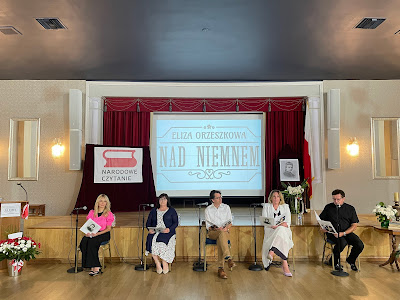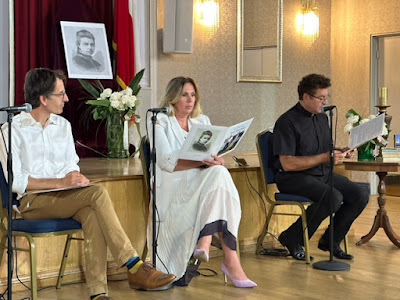Narodowe Czytanie, National Reading 9 September 2023, Los Angeles
Project of the Consulate General of the Republic of Poland in Los Angeles, under the honorary patronage of Consul General, Marta Wolanska
Collaborating Partners: Polish Parish of Our Lady of the Bright Mount – Sanctuary of John Paul II; Polish Alma Mater - Polish School, the Poland's Millenium Library, and the Helena Modjeska Art and Culture Club in Los Angeles
On Saturday, September 9, 2023, the Consulate of the Republic of Poland, in cooperation with four Polish organizations, presented National Reading, a global cultural event aimed at popularizing Polish reading and literature. This year's topic was the novel Nad Niemnem by Eliza Orzeszkowa, chosen because of the topic of the January Uprising, which, among other things, it touched upon. The year 2023 is the 160th anniversary of the outbreak of this uprising against the Russians occupying Poland since 1795.
WHO WAS ELIZA ORZESZKOWA?
A word about the writer and the novel Nad Niemnem
Dr. Maja Trochimczyk, President of the Modjeska Club
Who was Orzeszkowa? Known under the surname of her first husband (Piotr Orzeszko - hence Orzeszko-wa), as a child her name was Elżbieta Pawłowska, and she was the daughter of lawyer Benedykt. She was born on June 6, 1841 on the Milkowszczyzna family estate, but after her father's death (he died when she was only three years old) she lived in nearby Grodno, a city now in Belarus. It used to be a large Polish city in the Eastern Borderlands, near Białystok.
At home she was called Elise, or Lisa in French, she went to Warsaw to study at a boarding school for noble girls, where she became friends with Maria Konopnicka, later an equally famous writer. Her father had a large collection of books, so there was a lot to read; since childhood, Eliza showed her literary talent. However, she was only 17 years old when her mother selected her husband she was forced to marry. Piotr Orzeszko was 16 years older than Eliza. After marrying him in 1858, she lived on his estate in Ludwinów. During the January Uprising in 1863, they helped the insurgents; for instance. they took care of the wounded leader of the Uprising, Romuald Traugutt, for two weeks. This kindness cost them a lot. An informer denounced them and notified the Russian authorities about this; as a result, Piotr Orzeszko was arrested and sent to Siberia, where he died. The real estate property was taken by the Russian government. Orzeszkowa returned to her family home; she started reading and writing more - short stories, articles, and novels. After selling the estate in 1869, she lived in Grodno until her death and earned her living as a writer.
She combined artistic talent, careful observation and sensitivity to the melody of language with a positive philosophy of life. She belonged to the so-called group of positivists who were looking for a way for national survival in the era of repressions after the fall of the January Uprising. She believed in the ideals of social justice, the emancipation of women - that is, their education, upbringing in moral, national and religious values, and the right to professional work. Today women have these rights, back then they couldn't even go to college. Let us remember that Maria Skłodowska had to go to Paris to study chemistry and physics. She could not study in Polish lands ruled by Russia.
Orzeszkowa believed in national values related to the community of impoverished and patriotic nobility and peasants, and advocated cooperation between social classes. She admired the traditions of the provincial nobility - they had titles and noble coats of arms, but little money, so everyone worked on their small estates. "A nobleman on the farm, equal to the voivode!" Noblewomen wore white gloves to distinguish themselves from peasant women... When I was a child, my grandmother also wore white gloves and dressed me in such gloves when going to church on Sundays, during holidays in the countryside.
Orzeszkowa's characters lived close to nature; they created close, cordial bonds between people - in the family, in the village, on the estate: they worked together, celebrated holidays, sang and had fun. In a word, an Eden. Arcadia. This model of life, in which everyone can live in a house with a garden, grow their food, and enjoy contact with nature, is an ideal model for all humanity. There is enough space on Earth to make it happen. Apparently all the people in the world could be accommodated in houses with gardens on an area equal to Russia. If they were crammed into apartments, all nine billion of them would fit in Australia, and if they were crammed into large skyscrapers like in Manhattan, New Zealand would be enough for all of humanity. There is enough space for everyone. Only the richest billionaires, owners and controllers of giant corporations, giant financial institutions, do not want this - because independent, proud, self-sufficient people will never be their slaves.
Orzeszkowa did not like the richest of the nobility, denationalized, snobbish, bored, exploiting the peasants - because they did not work themselves, they were "above" the prose of everyday life... She criticized the snobbery, selfishness and leisure of the rich, foreign-educated Poles who cut themselves off from their roots, from national concerns and affairs. She promoted the cult of work as a cure for everything. She also cared about the assimilation and acceptance of Jews, to which she devoted several novels. In total, she wrote over forty novels and volumes of short stories. Let me quote some titles: The Last Love, From the Life of a Realist, In the Provinces, In the Cage, Virtuous, Pan Graba, Marta, Pompalińscy, Meir Ezofowicz, Widma (Ghosts), Sylwek Cmentarnik, Dziurdziowie, Cham, Jędza (Witch), Melancholicy and Bańka mydlana (A Soap Bubble).
In 1904, Orzeszkowa was a candidate for the Nobel Prize in Literature, competing with Henryk Sienkiewicz, who ultimately received the award for his masterpiece Quo Vadis. The novel that was submitted for "Elise Orzeszko" for the award was Nad Niemnem. The writer died in 1910 (she was almost the same age as Helena Modrzejewska, 1840-1909) and was buried in Grodno. Józef Kotarbiński said at the funeral: "She was the living wisdom and the feeling heart of the entire era..." Today, there is a monument in her honor in Grodno, and two monuments to Orzeszkowa are in Warsaw.
The novel Nad Niemnem was commissioned by a periodical; it first appeared in serialization in Tygodnik Ilustrowany in 1887. The entire novel was published in three volumes a year later. Nad Niemen shows the life of the nobility - both the richest and the provincial ones - in the Polish Eastern Borderlands, near Grodno. It is based on the author's authentic observations. The action takes place mainly in Korczyn - the estate of Benedykt Korczyński, modeled on the Miniewicze estate of the Kamieński family. Nearby there is a settlement of poor nobility, Bohatyrowicze: it ws a real place, later part of a village called Samostrzelniki... but we don't know whether anything was left of it after the war. My great aunt Antonina Glińska's Skarbkowo near Baranowicze, after her the murder of her husband by Soviets and her deportation with sons to Siberia, was incorporated into the collective farm, plowed up completely, only one pear tree was left in the fields... Aunt Tonia told me about it sadly, and her last pear tree was portrayed in my poem...
The theme of the novel Nad Niemnem was initially supposed to be the misalliance (that was the title, Misalliance) of a lady from a good home, although impoverished, but coming from high society, Justyna Orzelska (a cousin of the Korczyński family) and her beloved, simple and honest Jan Bohatyrowicz, a poor a nobleman from a small settlement. The author gradually expanded the number of characters and topics, thus portraying the entire nobility, various social classes, landscapes and nature in the novel. She devoted a lot of space to descriptions of nature - you can find detailed images of as many as 140 different plants in the text! The events during the action take place in 1886; they are confronted with memories from the past, from the time of the January Uprising of 1863. The decisions, values and fate of the characters "now" are reflected in the mirror of the past, when similar situations led to different decisions and different consequences.
Historian and literary critic Stanisław Brzozowski called Orzeszkowa "Mickiewicz's younger sister" - because she returned to themes and places known from his epic poem Pan Tadeusz, set in Lithuania on estates and in manor houses of the Polish nobility... The immense popularity of the novel Nad Niemnem resulted in the intervention of the Russian censorship that banned the printing of the fourth edition in 1890. Nad Niemnem has been popular for years. It was adapted into two films, made in 1939 and 1987, and a TV series. Two theater plays were also created on the basis of its stories. The wonderful panorama of life on the Niemen River contains many examples of the authentic Polish language from the Grodno area in the Borderlands, especially in the Bohatyrowicz family, the most positive characters of the novel. Orzeszkowa wrote about this version of the Polish language:
"One of the most original and interesting features that distinguish these people is their speech, their Polish language. At first, to those accustomed to today's literary and salon language it seems so unusual that some expressions are almost impossible to understand [...] However, after listening to it carefully, for a long time, it turns out to be simply old Polish and completely pure, only so old, that for many words you have to go to Rej [...] It gives the impression of serious, pure speech with a completely native spirit, especially since the syntax, word order and period phrases give a certain old-fashioned tone."
The values and ideals that Orzeszkowa promotes in the book are certainly not old-fashioned. She presents a vision of a dignified and just life, based on family relationships and national traditions, moral principles, respect and love for loved ones. These values are not antiquitated but timeless. It is a life close to nature; a peaceful existence in houses with gardens, in houses surrounded by fertile fields, where each family can grow everything they need and earn enough for a life of dignity and peace. This ideal was promoted by Orzeszkowa, a visionary in the 19th century; this ideal is valid both for us and for the whole world, for today and tomorrow.













No comments:
Post a Comment